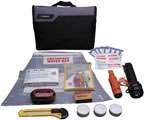
Planning ahead for emergencies is a good practice. It doesn't take much effort to get the basics together and make minimum preparations for immediate safety.
It's just the first week of June, and already those of us in the Southeast have gotten a heads-up call. The season isn't a week old, and already a tropical depression developed in the Gulf and threatened to grow to hurricane strength. If it had reached hurricane strength, the eye would have passed less than 40 miles west of my house. As it developed, the storm just turned into a “rain event.” We needed some rain around here anyway, so it just pretty well watered the yard and such, but it sure did wake everybody up.
A few weeks ago, my wife and personal terrorist, bin-Lottie, took me for a drive. We went out in the country to a nice little place that had several travel trailers in the yard. She told me to “Hook up to that one, I just bought it.” I hooked up to and brought home a 30-foot travel-trailer in perfect condition for a bargain price. My bride never ceases to amaze me.
This is a triple-use vehicle. We brought it home and hooked it up next door - water, septic, electric, cable, the whole deal. Now, when the grandkids come to visit, they've got space to stay up late and watch things I wouldn't allow on my TV. Plus, when we go on vacation, we can use it. And the big plus is: When a hurricane threatens the area, we've got a rolling hotel. I'm going to stock it with the basics for a week or so, so I can hook up and be gone within an hour or so.
The reason I write this is that we all think - or should think - about safety on the rig and around our workplace. We should do a little planning and preparation for things that are beyond our control, like nature. It doesn't take much to get the basics together: radio, flashlight - don't forget the batteries - fresh water, maybe a few cans of whatever it is that you eat when you're stuck at the rig overnight, and don't forget toilet paper - you've only got so many socks. Don't forget fuel. It's never a good idea to run your primary vehicle down to fumes - what if you have to suddenly get a couple hundred miles up the country to avoid something too big to handle? (I don't mean ex-wives here!)
It seems like most areas of the country occasionally have their own brand of disaster. The Southwest has been having more than its fair share of fires, the Midwest has tornados, the Pacific Rim has fault lines that have been building up energy for years and it's just a matter of time before something big enough to rattle your teeth happens. Scientists think the San Andreas Fault is overdue for a shift. California is not the only earthquake prone area, either. In 1811 and 1812, a series of three earthquakes occurred on the New Madrid Fault in Missouri. Strength estimates on the not-yet-invented Richter scale indicate an 8 or higher. The earth moved enough that the quake was felt in the entire country, except the Pacific Rim. The Mississippi River actually reversed course and flowed north for six months!
I don't think there is any place completely safe from natural disaster; I think we should all at least make the minimum preparation for our immediate safety. Most of us in our industry tend to be pretty self-sufficient, and that's the way it should be. Other than collecting taxes, I don't depend on the government to do much. Look at their performance after Katrina….
Maybe at our next safety meeting, we should include our families, and go over basic disaster preparations. Hurricane season looks like it gets a little longer and a little stronger every year, until we go through the latest climate cycle. I, for one, want to be ready. By the way, if I have to hook up and go, can I camp in YOUR yard?


Report Abusive Comment